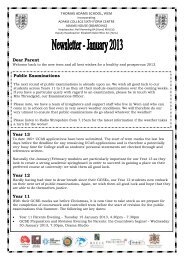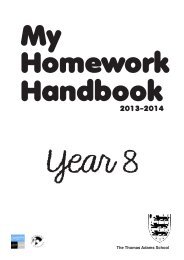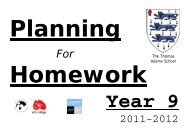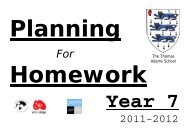Praise and Rewards - Thomas Adams School
Praise and Rewards - Thomas Adams School
Praise and Rewards - Thomas Adams School
Create successful ePaper yourself
Turn your PDF publications into a flip-book with our unique Google optimized e-Paper software.
The <strong>Thomas</strong> <strong>Adams</strong><br />
<strong>School</strong><br />
Policy Statement<br />
<strong>Praise</strong> <strong>and</strong> <strong>Rewards</strong><br />
2013/14<br />
Updated August 2013<br />
Reviewed by Governors<br />
PRAISE & REWARDS
This policy reflects the <strong>School</strong>’s continued belief in the “Every Child Matters” agenda which<br />
states that all pupils should:<br />
<br />
<br />
<br />
<br />
<br />
Be Healthy<br />
Stay Safe<br />
Enjoy <strong>and</strong> Achieve<br />
Achieve Economic Well-being<br />
Make a Positive Contribution<br />
<strong>and</strong> with the recognised Safeguarding Procedures within school, including Child Protection<br />
<strong>and</strong> Health <strong>and</strong> Safety. These highlight the need for this policy to take into account the<br />
Social <strong>and</strong> Emotional Aspects of Learning (SEAL):<br />
<br />
<br />
<br />
<br />
<br />
Self awareness<br />
Managing feelings<br />
Motivation<br />
Empathy<br />
Social Skills<br />
for all those working <strong>and</strong> learning within our school.<br />
<strong>Praise</strong><br />
The very best schools have praise cultures both in their classrooms <strong>and</strong> also within every aspect of<br />
their schools, whereby students all receive praise on a continuous basis which is;<br />
o justified<br />
o personalised, in that it is based on a good knowledge <strong>and</strong> underst<strong>and</strong>ing of<br />
individual students<br />
o delivered sensitively in ways which the individual student prefers<br />
backed up by communicating this to parents <strong>and</strong> family on every opportunity.<br />
Introduction<br />
There are few more valuable forms of both reward <strong>and</strong> also motivation than justified praise<br />
<strong>and</strong> recognition of achievement. Studies show that children respond quite remarkably to<br />
systems of positive reward <strong>and</strong> there is immense educational gain.<br />
The basic problems of a school's positive rewards system are, however, hard to overcome:-<br />
i. Teachers vary in st<strong>and</strong>ard <strong>and</strong>/or frequency of praise giving.<br />
ii. Teachers vary in how much time they give to making use of praise systems.<br />
iii. Monitoring to ensure consistency is difficult.<br />
iv. It is equally difficult to ensure that every student is receiving appropriate <strong>and</strong> deserved levels<br />
of praise <strong>and</strong> as a result less able <strong>and</strong> also quieter, hard working students in particular often<br />
do not get enough recognition.<br />
v. Students vary in the way they wish to receive praise <strong>and</strong> rewards.<br />
In the last resort a school has to rely on all teachers making use of the system whilst<br />
making use of procedures that are continuously highlighted <strong>and</strong> involve as little work as<br />
possible for the teacher.<br />
Criteria for Positive rewards<br />
1. All praise should be justified <strong>and</strong> based on high expectations <strong>and</strong> st<strong>and</strong>ards.<br />
2. All students should have equal opportunity to receive praise regardless of ability<br />
level.
Areas to be rewarded<br />
In the classroom <strong>and</strong> also in the wider school context<br />
Forms of Positive Reward<br />
1. Work of a high st<strong>and</strong>ard - academic, practical, sporting, artistic.<br />
2. Significant progress<br />
3. Consistent hard work <strong>and</strong> excellent attitude to work.<br />
4. Personal qualities worthy of praise, e.g. good manners, honesty, courtesy,<br />
helpfulness, reliability, displays of initiative, leadership skills etc.<br />
5. Resilience, bravery or determination in the face of difficulties<br />
6. Excellent or greatly improved attendance or punctuality.<br />
7. Service to the school or the community.<br />
1. In the classroom – this should be continuous<br />
- Teachers should use positive marking systems with written praise.<br />
- On giving back marked work teachers should go out of their way to praise students,<br />
either publicly as the work is given back or individually – (much depends on who the<br />
student is how you do it).<br />
- Good work being done in class should be praised. Students answering questions<br />
correctly should be praised.<br />
- Good work should be put on display.<br />
- Students receiving good termly reports should be praised personally by the teacher in<br />
class prior to the issue of the report.<br />
- Teachers should use the House Vivo Point System to support with all forms of positive<br />
reward.<br />
NB There should be awards <strong>and</strong> rewards for high attainment <strong>and</strong> achievement, but<br />
also for progress <strong>and</strong> other successes that are accessible by all, regardless of ability<br />
Whole <strong>School</strong><br />
<strong>Praise</strong> should be endemic to the school <strong>and</strong> this culture soon obvious to any visitor. This involves;<br />
o SLT, pastoral managers <strong>and</strong> tutors operating in the same climate of praise as<br />
in the classroom, <strong>and</strong> again making use of every opportunity to pass on <strong>and</strong><br />
give praise<br />
o Thanks given to students who are courteous, thoughtful, provide assistance to<br />
the school, are honest etc<br />
o Students gaining credit for their achievements out of school<br />
o The SLT thanking staff as well as students, always giving praise when praise<br />
is due<br />
<strong>Rewards</strong> <strong>and</strong> Recognition.<br />
This is invaluable as a support to teacher praise <strong>and</strong> other praiseworthy actions <strong>and</strong> achievements by<br />
students.<br />
2. <strong>Rewards</strong><br />
The House system allows for recognition <strong>and</strong> celebration of students’ achievement both<br />
academically, behaviourally <strong>and</strong> through extra-curricular activities.
House Vivo points can be earned for completing excellent classwork <strong>and</strong> homework <strong>and</strong> for<br />
attending extra-curricular activities, entering house competitions, excellent progress <strong>and</strong><br />
good citizenship <strong>and</strong> attendance.<br />
House Vivo points are awarded electronically <strong>and</strong> credited to the student’s individual<br />
“account”. All students then can access their account to view their progress.<br />
In addition students automatically receive house Vivo points when:<br />
- They receive a subject referral for good work, these reports are termly <strong>and</strong> the praise is<br />
indicated on the school report home<br />
- For an excellent conduct log – this is done every half term<br />
Individual house Vivo point totals are available to students whenever they log in to their<br />
Vivo account. This is introduced to students at the start of the academic year. In addition<br />
students can opt in to receive SMS messages updating them on their house Vivo balance.<br />
House assemblies are also an opportunity for house updates <strong>and</strong> as a means of celebrating<br />
achievement; these are held at least every half term. (See dates below)<br />
Students save <strong>and</strong> spend their Vivos on the rewards they want from an online catalogue <strong>and</strong><br />
the items are then delivered to them.<br />
All individual points are credited to make an overall house total. At the end of the autumn,<br />
spring <strong>and</strong> summer term house totals are announced <strong>and</strong> at the end of the academic year a<br />
house cup is awarded to the victorious house.<br />
In addition our Year 11 House Captains are offered the opportunity to go on a school trip<br />
twice a year in recognition of their involvement <strong>and</strong> organisation of house challenges.<br />
THE HOUSE SYSTEM<br />
The House system at <strong>Thomas</strong> <strong>Adams</strong> has 7 houses all named after local hills.<br />
All students as well as belonging to a form will also be a member of a house:<br />
7.1 – 11.1 CLEE<br />
7.2 – 11.2 LAWLEY<br />
7.3 – 11.3 HAUGHMOND<br />
7.4 – 11.4 CARADOC<br />
7.5 – 11.5 CORNDON<br />
7.6 – 11.6 HAWKSTONE<br />
7.7 – 11.7 GRINSHILL<br />
The aim of the house system is really to be a source of great fun, competition, achievement<br />
<strong>and</strong> teamwork with every student given the opportunity to represent their house at what<br />
activity they enjoy.<br />
Throughout the academic year the house system awards pupils for their good work <strong>and</strong><br />
attitude inside the class as well as outside of the class when they get involved in extracurricular<br />
activities.
Students collect House Vivo points that act as the schools reward currency <strong>and</strong> can be spent<br />
on items of their choice in the Vivo rewards online catalogue.<br />
The house system also promotes leadership <strong>and</strong> responsibility among the more senior<br />
students each house have 7 house captains which consist of:<br />
<br />
<br />
<br />
<br />
<br />
<br />
<br />
House captain<br />
Girls sports captain<br />
Boys sports captain<br />
Media captain<br />
Environment captain<br />
Citizenship <strong>and</strong> fundraising captain<br />
Vice Captain<br />
The house captains liaise closely with the house co-ordinator <strong>and</strong> the member of staff who is<br />
HEAD of their particular house.<br />
At the end of the academic year the house with the most house points receive the house<br />
cup.
AWARDING HOUSE POINTS 2013 – 2014<br />
Vivo Miles (introduced September 2013), is our online rewards system for allocating house<br />
points. Staff award pupils House Vivos (electronic house points) for good work, effort etc.<br />
Students save <strong>and</strong> spend their Vivos on the rewards they want from an online catalogue <strong>and</strong><br />
the items are then delivered to them.<br />
Students can check their Vivo balance by logging on to their account through Moodle or the<br />
vivomiles.com website.<br />
The Vivo tariff for 2013-2014 is:<br />
The role of Parent\Guardians<br />
Parent\Guardians can access Vivo online <strong>and</strong>:<br />
• have their own personal login which they can use to access their child's rewards<br />
balance <strong>and</strong> full transaction history<br />
• view stats <strong>and</strong> trends on how their child is earning points in terms of how many, for<br />
what reasons <strong>and</strong> from which teachers<br />
• can set-up instant, daily, weekly <strong>and</strong> monthly email alerts on their child's rewards<br />
• track all their children at <strong>Thomas</strong> <strong>Adams</strong> using one single login<br />
• can pledge treats based on the number of Vivos earned at school that are displayed<br />
when their child logs on <strong>and</strong> updates them by text if the pledge has been met.
Ways to award House Vivos
Measuring the Impact<br />
HOUSE ASSEMBLIES 2013-14
The <strong>School</strong> has a policy statement/plan for praise in place, with a member of the SLT<br />
working with the House Coordinator to monitor progress in this area <strong>and</strong> implement a<br />
whole school plan <strong>and</strong> who are the “champions” for developing the praise culture in<br />
school<br />
Evidence is collected <strong>and</strong> impact collected <strong>and</strong> impact assessed in terms of<br />
<strong>Praise</strong> records<br />
Records of staff praise<br />
<br />
<br />
Views of parents <strong>and</strong> students sought<br />
Lesson observations


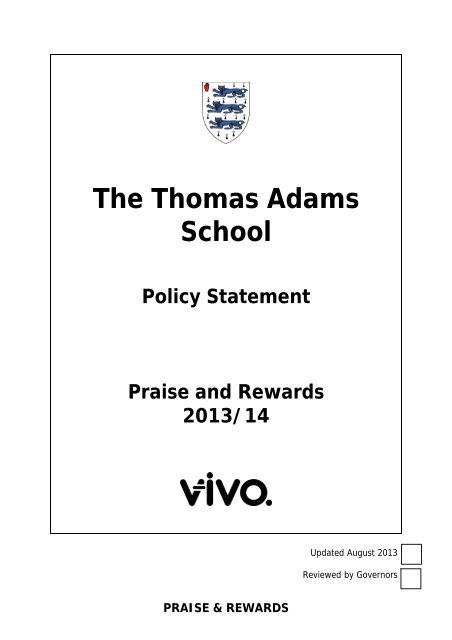
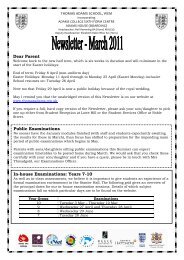
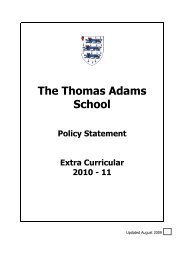
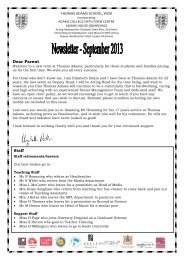
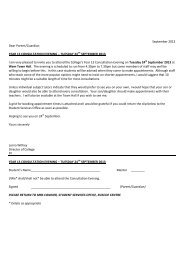
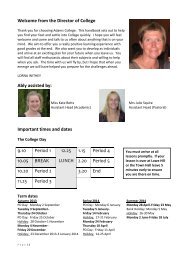
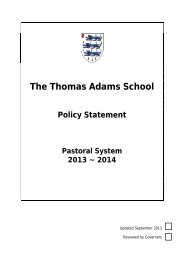
![HE Newsletter 2 Vol 2[1] - Thomas Adams School](https://img.yumpu.com/38376964/1/184x260/he-newsletter-2-vol-21-thomas-adams-school.jpg?quality=85)
